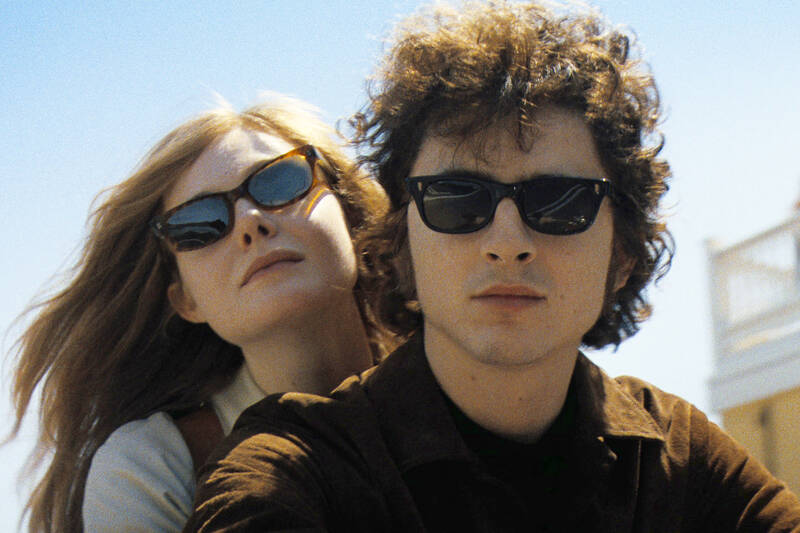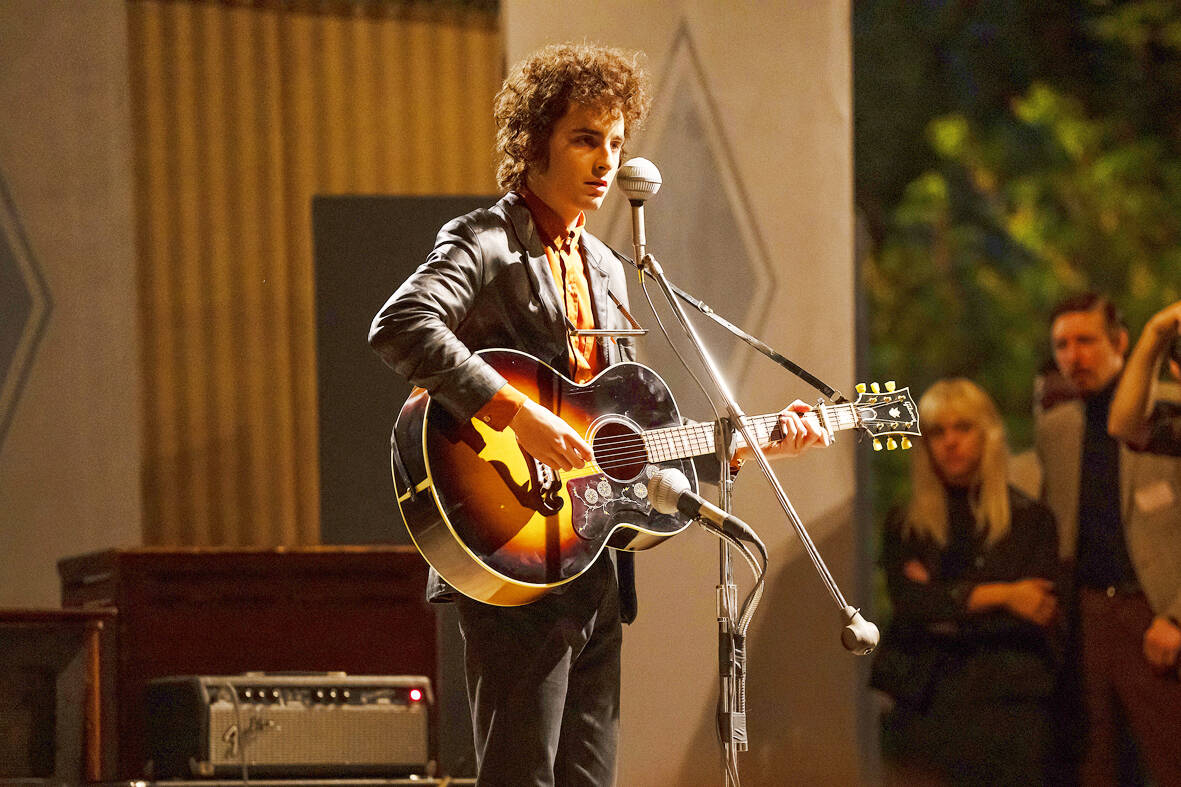It’s a remarkable performance. Star of the moment Timothee Chalamet inhabits the loose-limbed, live-wire physicality of the young Bob Dylan and makes an impressively good fist of capturing the frayed hessian of his distinctive voice. Acoustic guitars are plucked and harmonicas honked with the effortless fluency of someone who learned to play almost before they could walk.
Chalamet’s Dylan sucks so fervently on his cigarettes it’s as though he’s breathing in the genius of the musical heroes who came before him. But while he radiates insouciant charisma and channels the once-in-a-lifetime talent, he reveals next to nothing about Dylan as a person. This is not necessarily a failure in Chalamet’s acting. It’s a deliberate choice — the film, which is in Taiwan theaters, is called A Complete Unknown, after all, and it’s a manifesto as much as a title. But it does mean that this is more a movie about Dylan the phenomenon than Dylan the man; a picture that peers at the folk legend through the distorting lens of fame and fan worship.
As such, there’s a curious kinship between this handsome if formulaic period piece by music movie veteran James Mangold (he also directed the Johnny Cash portrait Walk the Line) and Michael Gracey’s recent Robbie Williams-as-monkey biopic, Better Man.

Photo: AP
Gracey’s film and A Complete Unknown both explore the impact of sudden and stratospheric celebrity on very young artists. Like Williams, Dylan is shown as a fully formed talent but a half-grown man. But while Williams mainlines fame like a drug and then bares his damaged soul to all, Dylan builds barricades against the encroaching tide of celebrity and protects himself with layers of assumed identities — an idea previously explored by Todd Haynes’s formally daring but frequently infuriating 2007 Dylan film I’m Not There.
The sunglasses, the Triumph motorbike, the studied disinterest, the sneer — it’s all, A Complete Unknown suggests, part of the wall that Dylan constructs to protect the vulnerable part of himself, if indeed it exists.
In one of several clearly signposted dialogue exchanges early in the film, Bob and his girlfriend Sylvie Russo (Elle Fanning in a role based on Dylan’s actual partner at the time, Suze Rotolo) discuss Now, Voyager, the Bette Davis-starring melodrama about the central character’s reinvention.

Photo: AP
“She just made herself into something different… what she wanted to be in that moment,” muses Dylan, who has already rewritten his own origin story to include a stint in a traveling carnival.
You can practically see the cogs turning under his unruly mop of hair. Shortly after this, Sylvie, who is due to go and study in Europe for a few months, gets to deliver another very on-the-nose line that sums up this particular aspect of the story: “I’m going to miss you,” she says, but then adds: “I realize I don’t know you.”
Mangold’s film is based on Elijah Wald’s 2015 book Dylan Goes Electric! (which culminates in an explosive extended sequence at the 1965 Newport folk festival) and makes Dylan’s rejection of traditional folk in favor of rock and blues-inspired electric guitars another one of its central themes.
This is foreshadowed in an equally heavy-handed manner. Pete Seeger (Edward Norton, beaming benevolently over his banjo), a folk elder statesman and de facto father figure for Dylan, interrogates the young troubadour about his musical allegiances: folk or rock. You can choose only one. These extremely pointed conversational markers can be a little jarring, undermining the film’s considerable strengths elsewhere.
Those strengths include the vividly evoked sense of a time and milieu (the burgeoning downtown New York folk scene of the early 1960s). It’s a world thick with pipe smoke and poetry readings, ripe with possibilities — a neat counterpoint to the Coen brothers’ depiction, in Inside Llewyn Davis, of a Greenwich Village paved with petty disappointments and humiliations.
Meanwhile, hit after hummable hit, the soundtrack is a tribute to Dylan’s incredible creativity during this period of his career, and the impact the songs had on his audiences.
There are moments when Mangold lays it on a little thick. Having slept on the Seeger family’s sofa, the young Bob noodles around on his guitar the next morning, playing a song that will eventually become Girl from the North Country. Pete stands, mouth agape and toothbrush at half-mast, transported by the genius that he’s witnessing.
What A Complete Unknown shows brilliantly, however, is the way that music in the right hands becomes a weapon. The galvanizing power of The Times They Are a-Changin’, debuting before a crowd that spontaneously joins in with the chorus, is thrilling. Better still are the sweetly savage harmonies between Dylan and his former lover Joan Baez (Monica Barbaro, whose note-perfect performance is the film’s secret ingredient) as they trade the lines of It Ain’t Me Babe like bitter recriminations.

On a harsh winter afternoon last month, 2,000 protesters marched and chanted slogans such as “CCP out” and “Korea for Koreans” in Seoul’s popular Gangnam District. Participants — mostly students — wore caps printed with the Chinese characters for “exterminate communism” (滅共) and held banners reading “Heaven will destroy the Chinese Communist Party” (天滅中共). During the march, Park Jun-young, the leader of the protest organizer “Free University,” a conservative youth movement, who was on a hunger strike, collapsed after delivering a speech in sub-zero temperatures and was later hospitalized. Several protesters shaved their heads at the end of the demonstration. A

Google unveiled an artificial intelligence tool Wednesday that its scientists said would help unravel the mysteries of the human genome — and could one day lead to new treatments for diseases. The deep learning model AlphaGenome was hailed by outside researchers as a “breakthrough” that would let scientists study and even simulate the roots of difficult-to-treat genetic diseases. While the first complete map of the human genome in 2003 “gave us the book of life, reading it remained a challenge,” Pushmeet Kohli, vice president of research at Google DeepMind, told journalists. “We have the text,” he said, which is a sequence of

In August of 1949 American journalist Darrell Berrigan toured occupied Formosa and on Aug. 13 published “Should We Grab Formosa?” in the Saturday Evening Post. Berrigan, cataloguing the numerous horrors of corruption and looting the occupying Republic of China (ROC) was inflicting on the locals, advocated outright annexation of Taiwan by the US. He contended the islanders would welcome that. Berrigan also observed that the islanders were planning another revolt, and wrote of their “island nationalism.” The US position on Taiwan was well known there, and islanders, he said, had told him of US official statements that Taiwan had not

Britain’s Keir Starmer is the latest Western leader to thaw trade ties with China in a shift analysts say is driven by US tariff pressure and unease over US President Donald Trump’s volatile policy playbook. The prime minister’s Beijing visit this week to promote “pragmatic” co-operation comes on the heels of advances from the leaders of Canada, Ireland, France and Finland. Most were making the trip for the first time in years to refresh their partnership with the world’s second-largest economy. “There is a veritable race among European heads of government to meet with (Chinese leader) Xi Jinping (習近平),” said Hosuk Lee-Makiyama, director